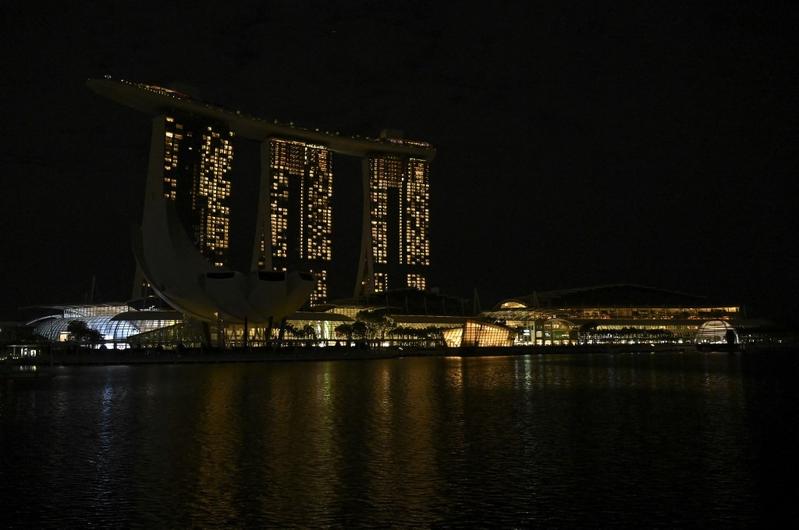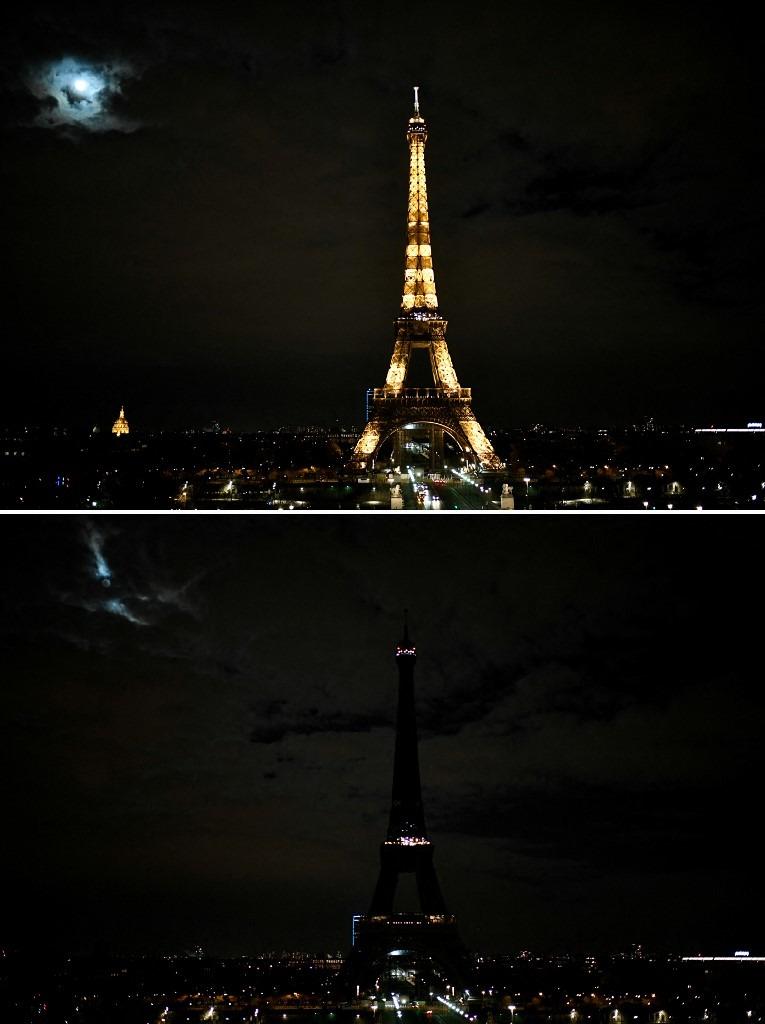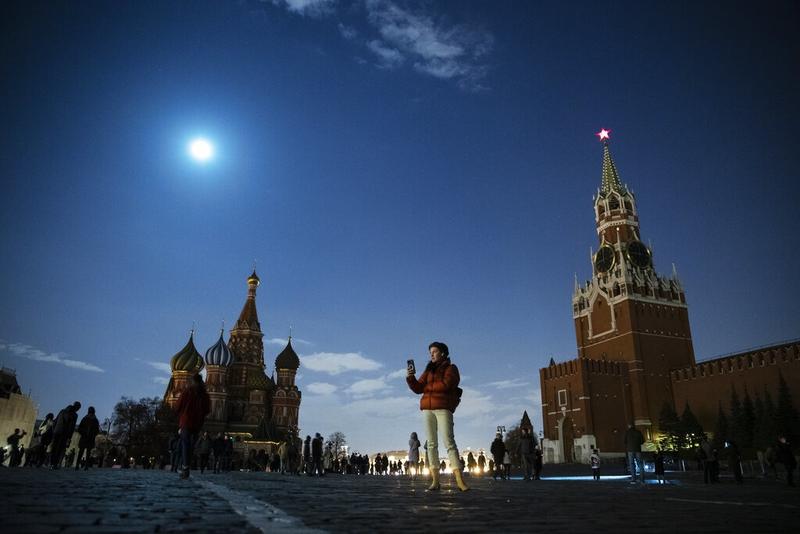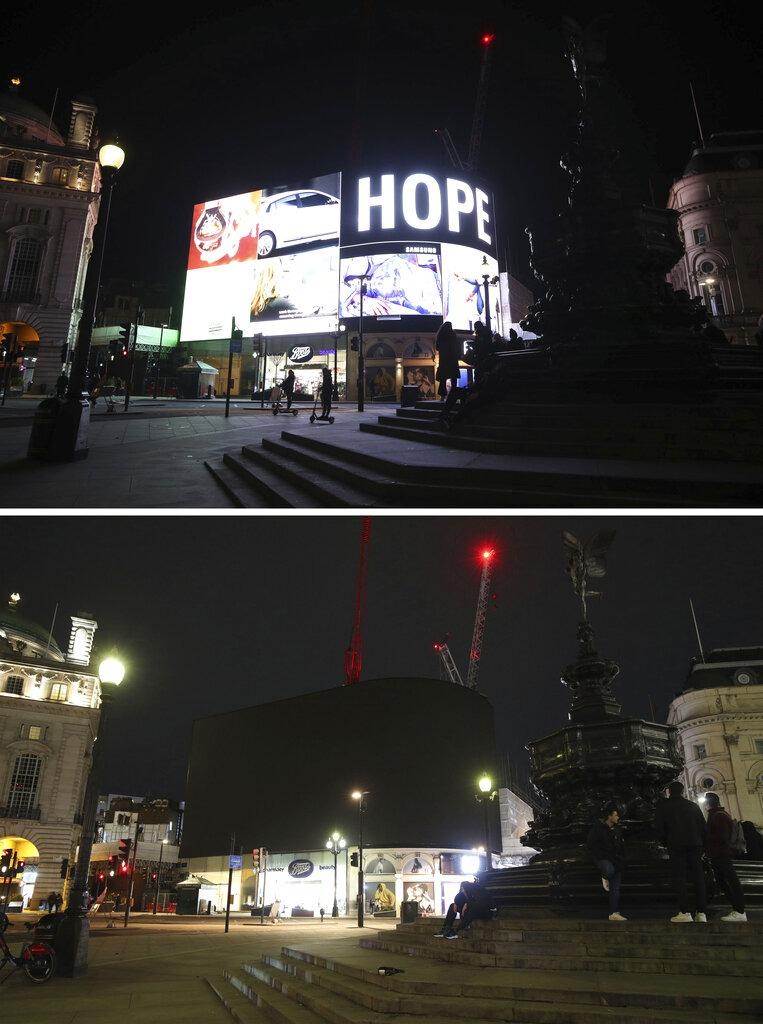 This photo shows the Marina Bay Sands hotels and resorts seen with the lights switched off to mark Earth Hour in Singapore on March 27, 2021. (ROSLAN RAHMAN / AFP)
This photo shows the Marina Bay Sands hotels and resorts seen with the lights switched off to mark Earth Hour in Singapore on March 27, 2021. (ROSLAN RAHMAN / AFP)
GENEVA - As lights around the world turn off at 8:30 pm local time on Saturday to mark Earth Hour 2021, World Wildlife Fund (WWF) International called for urgent action to turn the tide and secure a nature-positive world by 2030, while raising hopes the COP15 biodiversity conference to be held in China could become the next "Paris Agreement for nature".
This year's event shines a spotlight on the perilous state of the planet, urging individuals, leaders and environmentalists to set nature on the path of recovery.
This year is a particular year. We call it the "super year" for nature and sustainability because leaders can and must take ambitious and decisive action both on climate and nature.
Marco Lambertini, Director general of WWF International
"This is the time to unite people, to speak up for nature," WWF International Director General Marco Lambertini told Xinhua in a recent interview.
"This year is a particular year. We call it the 'super year' for nature and sustainability because leaders can and must take ambitious and decisive action both on climate and nature."
ALSO READ: Call for global action on climate change
Earth Hour is the WWF's flagship global environmental movement. Every year on the last Saturday of March, at 8.30 pm, millions of people in more than 180 countries and territories switch off the lights to show support for the planet.
 This combo photo shows the Eiffel Tower in Paris before (top) and after the lights were switched off as part of the Earth Hour environmental campaign on March 27, 2021. (STEPHANE DE SAKUTIN / AFP)
This combo photo shows the Eiffel Tower in Paris before (top) and after the lights were switched off as part of the Earth Hour environmental campaign on March 27, 2021. (STEPHANE DE SAKUTIN / AFP)
Born in Sydney in 2007, the initiative has grown into one of the world's largest grassroots campaigns for the environment, inspiring individuals, communities, businesses and organizations in more than 180 countries and territories to take tangible environmental action.
Lambertini also emphasized the scientific evidence pointing towards a close link between nature's destruction and rising incidences of infectious disease outbreaks like COVID-19.
"There has been new, shocking evidence about the condition of nature on the planet - one million species driven to extinction, a two-thirds global decline in wildlife populations in less than 50 years, 90 percent of fish stocks overfished in the ocean."
However, he also said on a positive note that the pandemic had also led to a new awareness to better protect the environment.
"All this together is really beginning to create a cultural shift so that nature conservation is not just an ecological issue, it's actually also an economic issue, a development issue, and a human health issue."
"Because at the end of the day, we understand that we depend on nature more than nature actually depends on us," he stressed.
 A woman uses her smartphone in Red square as Kremlin's Spasskaya Tower (right) and the St. Basil's Cathedral (left) are in darkness as the lights were turned off for one hour to mark Earth Hour in Moscow, Russia, on March, 27, 2020. (PAVEL GOLOVKIN / AP)
A woman uses her smartphone in Red square as Kremlin's Spasskaya Tower (right) and the St. Basil's Cathedral (left) are in darkness as the lights were turned off for one hour to mark Earth Hour in Moscow, Russia, on March, 27, 2020. (PAVEL GOLOVKIN / AP)
Kunming, the 'Paris' for nature?
Earth Hour comes ahead of key events when world leaders will take critical decisions on nature, climate change and sustainable development, setting the course of our future, the WWF said.
READ MORE: White House: Biden invited 40 world leaders to climate summit
In May, the 15th meeting of the Conference of the Parties to the Convention on Biological Diversity (COP15) will be held in the city of Kunming, in Southwest China's Yunnan province.
"On climate, we have a clear goal... Our society needs to be carbon neutral and this is necessary to keep global warming below 1.5 degrees Celsius, this is the Paris Agreement. We don't have the same for nature," Lambertini said.
"Kunming could be the Paris-style agreement for nature."
The Paris Agreement reached in 2015 aims to tackle climate change by cutting greenhouse gas emissions and sets a global target of keeping the rise in the average temperature no higher than 2 degrees Celsius above pre-industrial levels.
 In this combo photo, Piccadilly Circus is seen with the lights turned off (bottom) and turned on marking Earth Hour in London on March, 27, 2020. (YUI MOK / PA VIA AP)
In this combo photo, Piccadilly Circus is seen with the lights turned off (bottom) and turned on marking Earth Hour in London on March, 27, 2020. (YUI MOK / PA VIA AP)
Individual action
Personal choices in people's daily lives such as saving energy, reducing the use of plastic, using public transport, walking and cycling, and not wasting food, would help reduce our impact on the environment, Lambertini said.
"We are 8 billion people in the world and many of us are having a very heavy footprint on the planet. Every single action we can take individually multiplied by millions can really make a big difference."
"We need to consume less. Today, many of us consume far more than is actually needed, (and) are trapped in this consumerism that we need to curb and contain," he said.
READ MORE: Bill Gates: China makes climate change fight more affordable
 A composite image of two views of the Librty Statue of Budapest before (top) and after turning off its illumination lights to mark Earth Hour in Budapest, Hungary, March 27, 2021. (BALAZS MOHAI / MTI VIA AP)
A composite image of two views of the Librty Statue of Budapest before (top) and after turning off its illumination lights to mark Earth Hour in Budapest, Hungary, March 27, 2021. (BALAZS MOHAI / MTI VIA AP)
Lambertini also said that green investments and sustainable finance would help the financial sector lessen its impact on the natural world.
"There are increasingly available options for green finance, for green bonds, green investments. Go for it, because shifting the financial flows towards sustainable practices is a fundamental part for achieving a nature-positive and carbon-neutral future."
WWF International, based in Gland, Switzerland, is an independent conservation organization with a global network active in nearly 100 countries and regions.
Its mission is to stop the degradation of the planet's natural environment and to build a future in which people live in harmony with nature.


